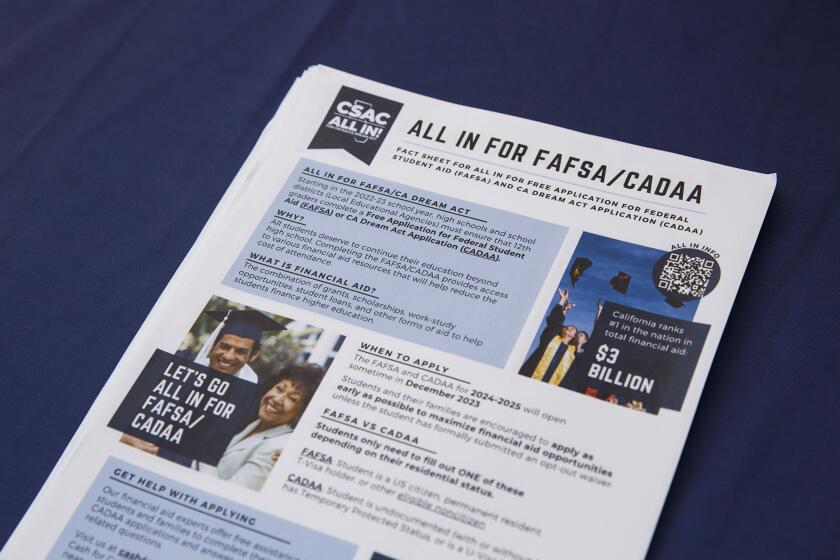Platform
The Southern California Studies Center at USC recently released its first Southern California “scorecard,” ranking the region as “red light” (bad), “yellow light” (troubled but functioning) or “green light” (in fine shape) in five categories. They were: crime and violence (red), economy (yellow), education (red), environment (yellow) and international links (green). The USC study was academic and far-reaching, but did not address how ordinary people felt about their futures. JIM BLAIR asked a cross-section of Southern Californians to name their top three concerns and rank them as red, yellow or green lights.
MARY WULFSBERG, Principal, Hemet High School; married, two grown stepchildren; lives in Murrieta
Education: yellow light
Security: yellow light
Community: yellow light
I don’t think anything is in real distress, but each needs constant attention and caution. Even though Hemet is an old school district, for example, you don’t get complacent just because things were great in the 1950s, and ‘60s and ‘70s and ‘80s. You’ve got to always be cautious about what you’re doing and where you’re headed.
Whether in public or private institutions or through home study or independent study, I’m very concerned with the education we’re giving our young people.
I’m looking for systems which not only encourage young people to be creative and flexible, to acquire basic skills, but also to develop a lifelong love of learning, an understanding of humankind and a tolerance of individual and cultural differences.
We’re making some really valiant efforts, [but] I’m a little concerned about understanding and tolerance. In spite of the fact that we have these issues in our curriculums, we still see a real lack of [both] qualities in human beings. My own stepchildren have become rather protectionist of their own children. In fact, my stepdaughter is home-schooling her children--she has eight. And my stepson is leaning in that direction.
Security includes having supportive friends and family, financial and economic stability, access to good health care, adequate fire and police protection and even something as basic as good roads and a transportation system you can depend on.
I see a real difference between Hemet and Murrieta. I work in Hemet and Hemet is a much older community. It has a strong sense of community and community pride. Hemet High School’s been here more than 100 years. Generations have gone through it. Things are rather predictable and fairly comfortable for them. Young people feel secure.
Murrieta’s new and has only been a city less than 10 years. There isn’t the stability there in the government, in the schools; It’s a more unsettling place to be. It’s developing a sense of community, but it’s got a long way to go.
*
PETER S. LOPEZ
Owner of delicatessen, art gallery, other small businesses; divorced father of five; lives in Oxnard
Economy: yellow light
Crime: almost red
Education: yellow light
As a businessperson, I am concerned about the costs of salaries, employee benefits, insurance, the cost of a range of things which are related to the operation of a business. I’m also concerned about the availability of spending money for the general public.
Crime seems to be rather rampant and to impact not only those areas that we might traditionally envision as crime-infested, but it seems to have cut across all socioeconomic levels and demographic areas.
Perhaps parents do not have sufficient time for their children’s education because of the needs of [our] two-parent working society or because of the single parent situation.
Our churches and schools need to work together to establish some sort of moral and ethical foundations. I sense a growing awareness of the moral and ethical problems we have gotten into, a growing awareness on the part of many people, even our younger people, that there needs to be change and that we need to have some standards and values.
It’s a hopeful sign.
*
CHERIE WILLIAMSON
Mother of four, South Bay, receives public assistance
Education: Yellow light
Childrens’ safety: red light
Job/child care: red light
I have worked before. I’m capable of working, but the way the system is, I’m limited because there’s no child care available. If I had it, I’d go to work today. The only thing I can do is put my name on a waiting list [for child care].
As far my children’s education, there are too many kids in these classes. They’re not pinpointing the child that needs a little bit more attention. They don’t have another teacher or an assistant who can take more time with the children. Kids get passed along [from grade to grade]. Only when they get up to a certain grade level do they notice a problem. Then it’s too late.
To me, in this world we live in, a lot of stuff they’re teaching the children they can’t use out there. They need safety, anti-drug things, how to protect themselves from violence and strangers.
I look at the world outside my window. There’s hope there, but they make it so hard to get.
PAUL R. CURRY
Sergeant, San Bernardino County Sheriff’s Department; married, two children; lives in Fontana
Economy: yellow light
Crime: red light
Educational opportunity: green light
California and especially the Inland Empire area suffered a tremendous economic blow with the closure of Norton Air Force. There [are fewer] job opportunities. Businesses are having a tough time trying to hold themselves together. I have neighbors and friends who have been out of work for a while.
[Crime seems to stem from] a lack of responsibility. You can’t drive the street or walk through a shopping mall without seeing a whole flock of lawless-looking folks in gang attire. They’re not kids out for a good time; they are looking to intimidate people.
I have a daughter going to Cal State San Bernardino. I’m really excited about the educational program there. I’ve seen the kind of ideas she’s bringing home, not necessarily [that] I agree with all of them, but they really are asking some of the right questions to develop their skills.
As for the future, I’d give Southern California a green light. I think we’ve made some strides cleaning up our air. Educational opportunities are there for those who want to take advantage of them. People are committed to reducing crime by supporting strong law enforcement. Industry is starting to come back.
The California entrepreneurial spirit lives.
*
MARGENE MEDEIROS
Orange County government employee, divorced mother of one daughter; lives in Orange
Enough money: yellow light
Child’s education (parochial school): green light
Challenging job: green light
To me, personally, doing meaningful work means the most. I’ve found that when I’m doing something that is going to make a difference in some way in other people’s lives--then I feel really good.
In the past couple of years, with the Orange County bankruptcy, there have been so many changes here. One of the best experiences that I had was working as executive secretary for Bill Popejoy [the former county CEO who oversaw emergence from bankruptcy] There was never down time; I remember days when I wouldn’t be able to get up and use the bathroom until 2 p.m.
It was crazy. Things were changing from hour to hour. There was so much anger from the public, understandably. But just trying to keep it all together was exciting. I really felt I was making a contribution to the county.
As for money, there never seems to be enough to pay all the bills and then have some mad money where I can just go out and spend. Right now seems to be a real critical time because of the holidays.
My daughter, in parochial school, is able to take programs like music, art and lab classes that would have been eliminated had she been in public school. All of those things are really important in getting a well-rounded education. When they get to do hands-on things, I think she learns more.
CARLOS CAMARGO
Graduating senior, Cal State Northridge, majoring in business
Race and gender relations: yellow light
Education: red light
Sense of community: yellow light
I think politicians continue to play the race card and, I think, seek to divide the population for personal gain.
With the passage of Proposition 209, for example, women and other minorities probably will not get the opportunities that I’ve gotten.
I came from East L.A., went to a Catholic high school, scored well on the SATs. [But regarding education in general,] the dropout rate for the U.S. is extremely high. I don’t think we value education as much as we should. If people are moving into our society not having the education they should, in the future they’re going to make decisions that affect me in terms of voting, in the way they raise their children.
At some point that cycle needs to be broken.
There really is a greater sense of community, I believe, in L.A. city and the county than there is in America as a whole. I have visited a lot of places and people in Los Angeles tend to be more open-minded and willing to experience what other cultural groups have to offer. Community means to me a sense of belonging, like to a family. But we have a long way to go--there are still too many hate crimes.










